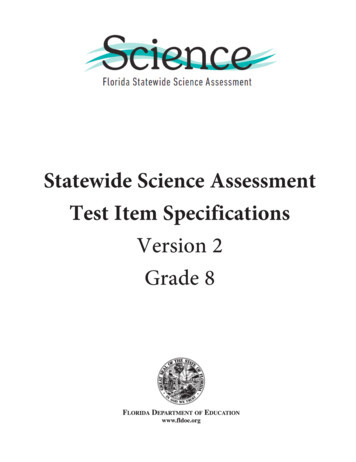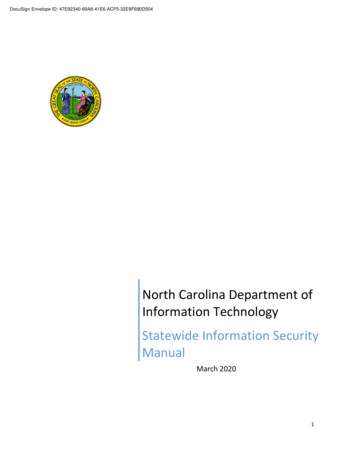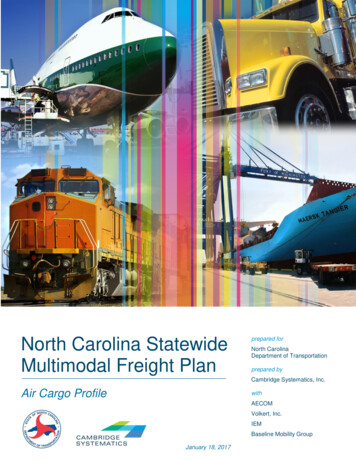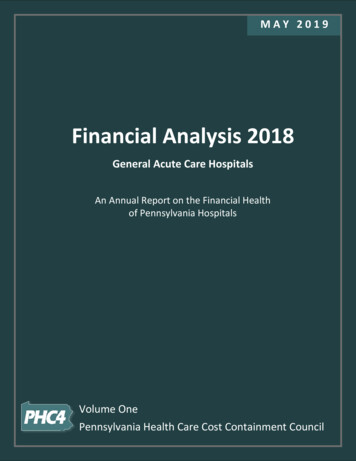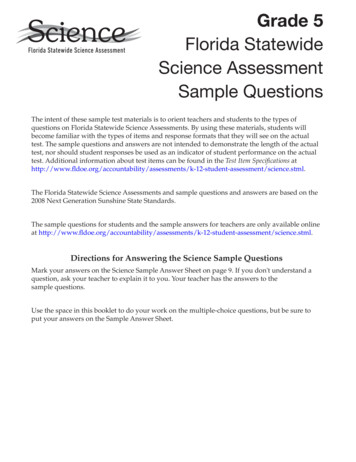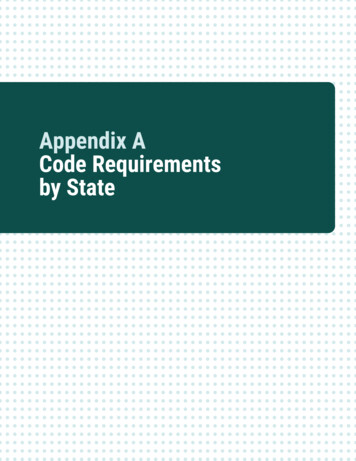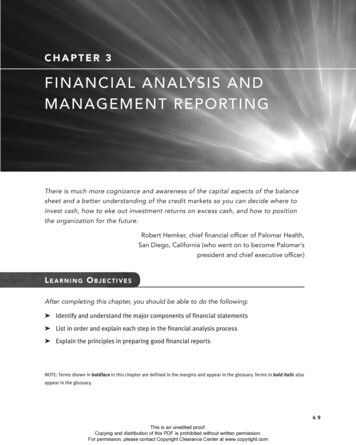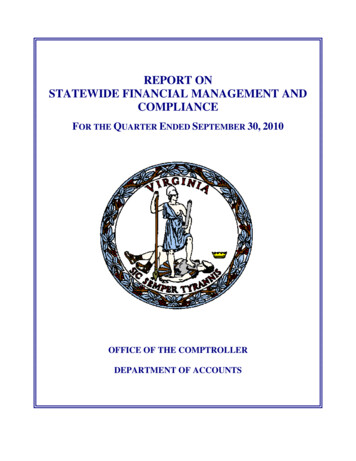
Transcription
REPORT ONSTATEWIDE FINANCIAL MANAGEMENT ANDCOMPLIANCEFOR THE QUARTER ENDED SEPTEMBER 30, 2010OFFICE OF THE COMPTROLLERDEPARTMENT OF ACCOUNTS
Prepared and Published byDepartment of AccountsCommonwealth of VirginiaP. O. Box 1971Richmond, VA 23218-1971Text and graphics were produced usingMicrosoft Word for Windows in Arialand Times New Roman fonts.
TABLE OF CONTENTSREPORT ON STATEWIDE FINANCIAL MANAGEMENTAND COMPLIANCEQuarter Ended September 30, 2010PageSTATEMENT OF PURPOSE . 2COMPLIANCE.Auditor of Public Accounts Reports - Executive Branch Agencies.Audit Reports – Quarter Ended September 30, 2010 .Audit Findings – Quarter Ended September 30, 2010.Risk Alerts – Quarter Ended September 30, 2010.Efficiency Issues – Quarter Ended September 30, 2010 .Special Reports – Quarter Ended September 30, 2010.Other Audit Reports Received – Quarter Ended September 30, 2010 .Status of Prior Audit Findings .Annual Summary of APA Audit Findings.Compliance Monitoring .ARMICS Compliance.Confirmation of Agency Reconciliation to CARS Reports.Response to Inquiries.Trial Balance Review .Analysis of Appropriation, Allotments and Expenditures and Cash Balances.Disbursement Processing.Paperwork Decentralization.Prompt Payment Compliance .E-Commerce.Financial Electronic Data Interchange (EDI) .Travel EDI.Direct Deposit .Payroll Earnings Notices .Small Purchase Charge Card (SPCC) and Increased Limit (Gold) Card .Travel Charge Card .Payroll Controls.PMIS/CIPPS Payroll Audit .PMIS/CIPPS Exceptions .Payroll Certification .Health Care Reconciliations 262656668FINANCIAL MANAGEMENT ACTIVITY.Commonwealth Accounting and Reporting System (CARS) .Payroll .Accounts Receivable.Indirect Costs .Loans and Advances .6969717385879/30/10 Quarterly Report1Department of Accounts
STATEMENT OF PURPOSEThe Code of Virginia requires that the Department of Accounts (DOA) monitor and account forall transactions involving public funds. In order to carry out this mandate, the Department uses avariety of measures, including automated controls, statistical analyses, pre-audits and post-audits,staff studies and reviews of reports issued by the Auditor of Public Accounts. When taken as awhole, these measures provide an important source of information on the degree of agencycompliance with Commonwealth accounting and financial management policies, internalcontrols, procedures, regulations, and best practices.The Comptroller’s Report on Statewide Financial Management and Compliance (the QuarterlyReport) is a summary of measures used by DOA to monitor transactions involving public fundsand report findings to the Governor, his Cabinet, and other senior State officials. The QuarterlyReport uses exception reporting and summary statistics to highlight key findings and trends. TheDepartment also provides additional detailed financial management statistics for agencies andinstitutions of higher education.This Quarterly Report includes information for the quarter ended September 30, 2010, andcomparative FY 2010 data. Some information in the report is for the quarter ended June 30,2010, which is the most current data available.David A. Von Moll, CPA, CGFMComptroller9/30/10 Quarterly Report2Department of Accounts
COMPLIANCEAuditor of Public Accounts Reports - Executive Branch AgenciesAgency audit reports issued by the Auditor of Public Accounts (APA) may contain findingsbecause of noncompliance with state laws and regulations. Agencies may also have internalcontrol findings considered to be control deficiencies. Control deficiencies occur when thedesign or operation of internal control does not allow management or employees to prevent ordetect errors that, in the Auditor’s judgment, could adversely affect the agency’s ability torecord, process, summarize, and report financial data consistent with the assertions ofmanagement.Each agency must provide a written response that includes a Corrective Action Workplan (CAW) tothe Department of Planning and Budget, the Department of Accounts, and the agency’s CabinetSecretary when its audit report contains one or more audit findings. Workplans must be submittedwithin 30 days of receiving the audit report. Commonwealth Accounting Policies and Procedures(CAPP) manual, Topic 10205, Agency Response to APA Audit, contains instructions and guidance onpreparing the workplan.The APA also reports risk alerts and efficiency issues. Risk alerts address issues for which thecorrective action is beyond the capacity of the agency management to address. Efficiency issuesidentify agency practices, processes or procedures which the auditors believe agency managementshould consider in order to improve efficiency. Risk alerts and efficiency issues are summarizedfollowing the Audit Findings section.The APA also issued several Special Reports during the quarter. These reports are listedfollowing the Efficiency Issues section. The full text of these reports is available atwww.apa.virginia.gov.Audit Reports – Quarter Ended September 30, 2010The APA issued eight separate reports covering 46 agencies, colleges and universities for theExecutive Branch. Four of the reports were for fiscal year ended June 30, 2010. The lastcolumn indicates whether the CAW has been received as of the date of this publication for eachagency with audit findings. Note that in some cases, the CAW may not have been receivedbecause it is not yet vedAdministrationNoneAgriculture and ForestryNone9/30/10 Quarterly Report3Department of Accounts
Commerce and TradeNoneEducationNew College InstituteNorfolk State UniversityVirginia Community College System (1)Blue Ridge Community CollegeCentral Virginia Community CollegeDabney S. Lancaster Community CollegeDanville Community CollegeEastern Shore Community CollegeGermanna Community CollegeJ. Sargeant Reynolds Community CollegeJohn Tyler Community CollegeLord Fairfax Community CollegeMountain Empire Community CollegeNew River Community CollegeNorthern Virginia Community CollegePatrick Henry Community CollegePaul D. Camp Community CollegePiedmont Virginia Community CollegeRappahannock Community CollegeSouthside Virginia Community CollegeSouthwest Virginia Community CollegeThomas Nelson Community CollegeTidewater Community CollegeVirginia Highlands Community CollegeVirginia Western Community CollegeWytheville Community CollegeExecutive OfficesOffice of the Governor (5)Lieutenant Governor (5)Division of Selected Agency SupportServices (2) (5)Citizens’ Advisory CouncilInterstate Organization ContributionsOffice of Commonwealth PreparednessOffice of Substance Abuse PreventionSecretary of the CommonwealthVirginia-Israel Advisory BoardThe Governor’s Cabinet Secretaries (3) (5)Secretary of AdministrationSecretary of Agriculture and ForestrySecretary of Commerce and TradeSecretary of EducationSecretary of Finance9/30/10 Quarterly rtment of Accounts
Secretary of Health and Human ResourcesSecretary of Natural ResourcesSecretary of Public SafetySecretary of TechnologySecretary of TransportationFinanceNoneHealth and Human ResourcesNoneNatural ResourcesDepartment of Conservation and Recreation (4)Public 000000N/AN/AN/AN/AN/A022YES(1)(2)(3)(4)One Report covering 23 colleges and one central office.One Report covering six entities.One Report covering ten agencies.This report includes the Virginia Land Conservation Foundation and the Chippokes Plantation FarmFoundation.(5) These four reports contain fiscal year 2010 data. 9/30/10 Quarterly Report5Department of Accounts
Audit Findings - Quarter Ended September 30, 2010The following agencies had one or more findings contained in the audit report. Short titlesassigned by the Auditor of Public Accounts (APA) are used to describe the finding, along with abrief summarization of the comments. The audit reports contain the full description of eachfinding.EducationNorfolk State University (NSU)1. Improve Information Security Program. NSU does not address the Commonwealth’sminimum security standards in its information security program, which decreases NSU’seffectiveness in protecting confidential data and ability to train staff to consistently manageIT systems with mission-critical data. Specifically, NSU’s program does not address therequirements related to Risk Assessment, Administrator Accounts, Users Accounts orLogging for some sensitive systems. The APA recommends that NSU’s InformationSecurity Officer address the issues above and work with the internal audit department tocoordinate future reviews that evaluate the program’s effectiveness.2. Strengthen Clearing Procedures Over Separated Employees. NSU should continue toimprove procedures to properly process separated employees. When an employee separatesemployment, NSU must perform several actions including the removal of access to criticalsystems and determining if any amounts are due to the employee. NSU has developed thepolicies and procedures to properly separate employees; however, there is neither theoversight nor the enforcement mechanisms in place to make sure employees follow theprocess. Failure to comply with the process allows separated employees access to criticalsystems and could result in them receiving improper payments from NSU. Four out of 20separated employees tested were not removed timely from NSU systems. In addition, threeout of six employees tested who separated with leave balances were not paid timely. NSUshould review and implement a process for managers to provide the appropriate oversightand enforcement of NSU’s process.3. Promptly Calculate and Return Title IV Funds for Unofficial Withdrawals. NSU’s FinancialAid Office did not promptly calculate and return Title IV funds for 47 students. TheRegistrar’s office identified these students at the end of the semester as unofficiallywithdrawn from classes for the fall 2008 and spring 2009 terms. Student Financial AidOffice staff failed to properly evaluate the status of the students identified on the Registrar’send of semester report, and did not perform the Title IV fund calculations.Section 34 CFR 668.22 “Treatment of title IV funds when a student withdraws” requiresinstitutions to identify students who have withdrawn, to calculate earned and unearned funds,and to return the unearned funds to the Department of Education as soon as possible, but nolater than 45 days after the college first determined the student withdrew. In December 2009,after the issue was identified and the Financial Aid Office notified, the Office calculated and9/30/10 Quarterly Report6Department of Accounts
returned the total unearned financial aid of 46,758 for these students to the Department ofEducation. As a result, there are no questioned costs.The APA recommends that Financial Aid management strengthen its review procedures toensure that staff performs all Title IV refund calculations accurately and in a timely manner.Better controls will help NSU comply with federal regulations, avoid possible fines, andensure federal financial aid continues to be available for students.4. Comply with Federal Regulations for Exit Counseling. NSU did not perform timely exitinterview procedures for Perkins loan student borrowers who stopped attending prior tograduation without notifying NSU. Seven students listed on the Default Report for theCohort Year 2008/2009 were tested. Student Accounts did not perform the required exitinterview procedures for six of the seven students.Section 34 CFR 674.42(b) “exit interview” specifies that if the student borrower withdrawsfrom school without the school’s prior knowledge or fails to complete an exit counselingsession, the school must provide exit counseling through either interactive electronic meansor by mailing counseling material to the borrower at the borrower’s last known addresswithin 30 days after learning that the borrower has withdrawn from school or failed tocomplete exit counseling. Student Accounts should perform adequate exit counselingprocedures for all Perkins borrowers according to federal regulations. Exit counselingprovides borrowers with information such as monthly payment amounts and advises theborrowers of the importance of their repayment obligation and the consequences of notmeeting this obligation.Central Virginia Community College (CVCC)1. Properly Manage Title IV Refunds. During fiscal year 2009, CVCC did not compute TitleIV refunds for students who unofficially withdrew during the Fall 2008 semester until April2009. The federal programs require the institution to do these calculations promptly after theend of the semester and return the funds to the federal programs within 45 days thereafter.Section 34 CFR 668.22, “Treatment of Title IV Funds When a Student Withdraws,”requires identification of students who have withdrawn, the calculation of earned andunearned funds, and the return of unearned funds to the Department of Education. Thesection also requires that colleges return unearned Title IV funds as soon as possible to thefederal Department of Education, but no later than 45 days after the college determines thestudent withdrew.Dabney S. Lancaster Community College (DSLCC)1. Improve Implementation of New AIS User Roles. DSLCC is not adequately usingAdministrative Information System user roles developed by the System Office in February2010. The System Office developed these user roles to ensure adequate separation of dutieswithin the financial system. DSLCC is granting access to individuals based on the previousroles assigned to individuals, and some individuals have access to both enter and approvetransactions. While it appears that the same individual is entering and approving thetransactions within the system, a second individual is manually approving transactionsoutside of the system before the originator approves the transaction in the system.9/30/10 Quarterly Report7Department of Accounts
The manual approval of transaction is both ineffective and inefficient since the individualwith electronic entry and approval access can change the transaction after the manualapproval without any effective oversight. Managing separation of duties electronicallywithin the financial system through user access rather than through manual processes is moreefficient and effective, provides a documented audit trail, and reduces the risk ofinappropriate transactions. The System Office should continue to work with DSLCC toensure that they review their processes, and DSLCC should ensure they have adequatelyevaluated user access and made changes to better reflect proper separation of duties withinthe financial system.2. Improve Revenue Contract Management. DSLCC does not have written policies andprocedures for collecting and accounting for contract revenues. DSLCC has revenuecontracts with vendors to provide goods and services to the students and others whereDSLCC receives either a percentage of sales, rental income, or a commission. The SystemOffice should work with DSLCC to ensure that it reviews its revenue contract managementprocess.Eastern Shore Community College (ESCC)1. Improve Revenue Contract Management. ESCC does not have written policies andprocedures for collecting and accounting for contract revenues. ESCC has revenue contractswith vendors to provide goods and services to the students and others where ESCC receiveseither a percentage of sales, rental income, or a commission. ESCC does not have a writtencontract with its vending machine vendor. The System Office should work with ESCC toensure that it reviews its revenue contract management process.J. Sargeant Community College (JSRCC)1. Improve Safeguards over Gift Card Awards. JSRCC purchases gift cards and other items asemployee and student recognition awards, but does not adequately safeguard these gift cardsnor keep adequate records of the individuals receiving the gift cards and award items fordistribution. The APA noted approximately 7,300 in gift card and award purchasesdistributed to the JSRCC’s campuses without any records of who received cards and why. Inaddition, before awarding the cards, some personnel were keeping the gift cards in anunlocked desk drawer with access available to anyone in the office. JSRCC should improvesafeguards over the gift cards before distribution as employee and student recognitionawards. JSRCC should track the cards from purchase to distribution and make sure thatpersonnel holding and awarding the cards follow appropriate procedures to physicallysafeguard the cards and use them only for the intended purpose.2. Improve Revenue Contract Management. JSRCC does not have written policies andprocedures for collecting and accounting for contract revenues. JSRCC has revenuecontracts with vendors to provide goods and services to the students and others where JSRCCreceives either a percentage of sales, rental income, or a commission. JSRCC’s vendingmachine contract expired in fiscal year 2008 and the downtown campus did not update itsApril 1981 food services and vending contract until July 2009. The System Office shouldwork with JSRCC to ensure that it reviews its revenue contract management process.9/30/10 Quarterly Report8Department of Accounts
John Tyler Community College (JTCC)1. Improve Implementation of New AIS User Roles. JTCC is not adequately usingAdministrative Information System user roles developed by the System Office in February2010. The System Office developed these user roles to ensure adequate separation of dutieswithin the financial system. JTCC is granting access to individuals based on the previousroles assigned to individuals, and some individuals have access to both enter and approvetransactions. While it appears that the same individual is entering and approving thetransactions within the system, a second individual is manually approving transactionsoutside of the system before the originator approves the transaction in the system.The manual approval of transaction is both ineffective and inefficient since the individualwith electronic entry and approval access can change the transaction after the manualapproval without any effective oversight. Managing separation of duties electronicallywithin the financial system through user access rather than through manual processes is moreefficient and effective, provides a documented audit trail, and reduces the risk ofinappropriate transactions. The System Office should continue to work with JTCC to ensurethat they review their processes, and JTCC should ensure that they have adequately evaluateduser access and made changes to better reflect proper separation of duties within the financialsystem.2. Improve Revenue Contract Management. JTCC does not have written policies andprocedures for collecting and accounting for contract revenues. JTCC has revenue contractswith vendors to provide goods and services to the students and others where JTCC receiveseither a percentage of sales, rental income, or a commission. JTCC received revenuecommissions late, based on the contractually agreed-upon date, for nine of the months incalendar year 2009. The System Office should work with JTCC to ensure that it reviews itsrevenue contract management process.Mountain Empire Community College (MECC)1. Properly Manage Title IV Refunds. MECC Financial Aid Staff were not properly calculatingTitle IV refunds for students who unofficially withdrew during the Fall 2008 semester. TheStudent Financial Aid Staff used the semester midpoint when calculating the percentageearned rather than using the last date of attendance. Based on a sample of students whoreceived no passing grades, four of seven students tested did not have an accurate Title IVrefund calculation. MECC recomputed the refunds of amounts to return to the federalprograms for all students who unofficially withdrew during the semester and determined thatno additional amounts were due to the federal programs.Northern Virginia Community College (NVCC)1. Resolve Internal Control Issues at Northern Virginia Community College. This is a repeatfinding. After two annual audits by the Auditor of Public Accounts and reviews by theVirginia Community College System internal auditors, NVCC has not completed correctiveaction on several significant findings. In addition to the summary of the APA audit findingsbelow, the internal auditors identified 22 areas where NVCC should improve their internalcontrols. The follow up of issues at NVCC during this APA audit found that many of theseproblems remain unresolved. The following issues were noted during the audit:9/30/10 Quarterly Report9Department of Accounts
NVCC has not updated their financial operating policies and procedures in areas such aspayment processing, revenue deposits and reconciliations, and capital asset managementand accounting since the July 2007 implementation of the new financial system,Administrative Information System (AIS).NVCC does not have a reconciliation process for its two major administrative systems:AIS and Student Information System (SIS). Without such reconciliation, differencesbetween the two systems may remain unresolved and errors may remain undetected.NVCC does not have policies and procedures for AIS and SIS system access and doesnot assign access based employee job duties. All employees in the Business Office haveidentical access, as opposed to unique access based on job responsibilities. Withoutpolicies related to access to its automated systems, NVCC risks having unauthorizedpersons gaining access to its systems or employees having access beyond what isnecessary for their job duties.NVCC does not have a payroll system security officer to perform important securityfunctions such as ensuring that controls exist to prevent unauthorized access to thesystem; approving and documenting changes to system access; and performing anddocumenting payroll system security activity. The security officer would also evaluatethe appropriate payroll system security levels for staff and monitor those security levelsto ensure they are appropriate based on the employee’s job duties. The absence of apayroll system security officer and controls over payroll system access exposes NVCC tothe risk of unauthorized viewing of and changes to sensitive employee and payroll data.NVCC does not have documented policies and procedures describing roles,responsibilities, controls, and procedures for reporting and writing off accountsreceivables. NVCC does not have a procedure in place for reporting accounts receivablefrom each of the nine campuses or efficiently consolidating the accounts receivablereporting process. Without proper policies related to accounts receivable, NVCC mayhave difficulties in monitoring and collecting amounts due.The System Office should continue to work with NVCC to improve its internal controlsincluding implementing policies and procedures over financial operations such as those overaccounts receivable and information systems. NVCC should ensure that the AIS and SISsystems are promptly reconciled and that any differences are resolved promptly. NVCCshould assign system access to users based on each employee’s job responsibilities. NVCCalso should consider consolidating its accounts receivable accounting in one system. Inaddition, NVCC should assign a payroll system security officer and strengthen theinformation security of its payroll system.2. Improve Revenue Contract Management. NVCC does not have written policies andprocedures for collecting and accounting for contract revenues. NVCC has revenue contractswith vendors to provide goods and services to the students and others where NVCC receiveseither a percentage of sales, rental income, or a commission. The System Office should workwith NVCC to ensure that it reviews its revenue contract management process.Rappahannock Community College (RCC)1. Improve Implementation of New AIS User Roles. RCC is not adequately usingAdministrative Information System user roles developed by the System Office in February2010. The System Office developed these user roles to ensure adequate separation of dutieswithin the financial system. RCC is granting access to individuals based on the previous9/30/10 Quarterly Report10Department of Accounts
roles assigned to individuals, and some individuals have access to both enter and approvetransactions. While it appears that the same individual is entering and approving thetransactions within the system, a second individual is manually approving transactionsoutside of the system before the originator approves the transaction in the system.The manual approval of transaction is both ineffective and inefficient since the individualwith electronic entry and approval access can change the transaction after the manualapproval without any effective oversight. Managing separation of duties electronicallywithin the financial system through user access rather than through manual processes is moreefficient and effective, provides a documented audit trail, and reduces the risk ofinappropriate transactions. The System Office should continue to work with RCC to ensurethat they review their processes, and RCC should ensure that they have adequately evaluateduser access and made changes to better reflect proper separation of duties within the financialsystem.2. Improve Revenue Contract Management. RCC does not have written policies andprocedures for collecting and accounting for contract revenues. RCC has revenue contractswith vendors to provide goods and services to the students and others where RCC receiveseither a percentage of sales, rental income, or a commission. RCC’s vending machinecontract expired in fiscal year 2007. The System Office should work with RCC to ensurethat it reviews its revenue contract management process.Executive OfficesSecretary of the Commonwealth (SOC)1. Improve Compliance with the Commonwealth’s Deposits Policy. The Commonwealthrequires agencies to deposit state funds no later than the next business day followingcollection. The SOC’s office is not transferring its collections in time for the Division ofSelected Agency Support Service
Tidewater Community College : 0 . 0 : 0 . N/A : Virginia Highlands Community College . 0 : 0 . 0 : N/A . Virginia Western Community College : 0 . 0 : 0 . N/A : Wytheville Community College . 0 : 0 . 0 : N/A . Executive Offices : . withdrawn from classes for the fall 2008 and spring 2009 terms. Student Financial Aid
